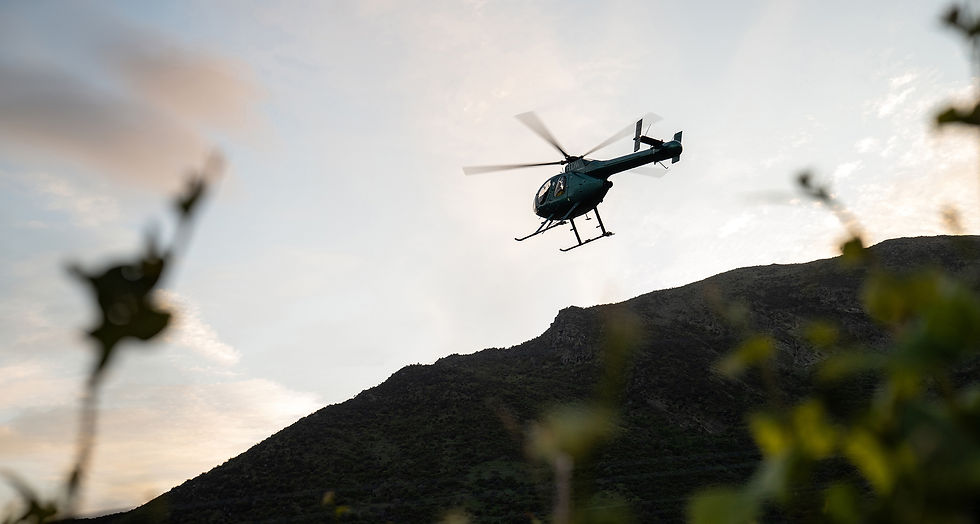Operation Carrot Drop: How Poisoning Rabbits Helps New Zealand Farmers Reclaim Their Land
- centralheliwork
- Nov 28, 2024
- 4 min read

Operation Carrot Drop: How Poisoning Rabbits Helps New Zealand Farmers Reclaim Their Land
As New Zealand farmers confront rising rabbit populations that jeopardise their livelihoods, a unique approach called is emerging as a viable solution. This method not only helps control rabbit numbers but also serves as a crucial tool for farmers striving to reclaim their agricultural land.
The impact of a booming rabbit population can be severe. For farmers in New Zealand, these cute creatures are a serious agricultural pest. Alarmingly, a mere 7-10 rabbits can consume as much pasture as one sheep. This competition for essential resources results in significant losses for farmers, making the need for intervention clear.
This post explores the ecological benefits of managing rabbit populations through targeted poisoning and illustrates how this controversial method can assist farmers while enhancing New Zealand's ecological landscape.
So, How Poisoning Rabbits Helps New Zealand Farmers Reclaim Their Land - let's get into it.
Understanding the Problem
Rabbits have caused considerable disruption to New Zealand's agricultural landscape since their introduction in the 19th century. Their aggressive foraging habits make them relentless competitors for grasslands.
According to the Department of Conservation, they can cause up to NZD 60 million in losses annually across the farming sector. This competition poses a threat not only to livestock productivity but also leads to soil erosion due to their burrowing habits, which exacerbates the damage in vulnerable areas.
Given these challenges, it is crucial for farmers to implement effective strategies to restore balance on their farms and in the environment.

The Impact of Rabbit Populations on Agriculture
The implications of rabbit overpopulation extend beyond competition with livestock. These animals can carry serious health risks for cattle, notably as carriers of bovine tuberculosis. This disease can decimate livestock herds, posing a dire threat to farmers' livelihoods. In fact, a study indicated that herds affected by bovine tuberculosis can face losses of around NZD 200,000 per infected herd.
Furthermore, rabbits threaten native plant communities by feeding on vulnerable species, which has far-reaching effects on local biodiversity. This browsing activity disrupts the balance of the ecosystem and encourages the survival of mammalian predators that can contribute to the extinction of native animals. The decline in these species paints a sobering picture for New Zealand's unique ecosystem.
Carrots In, Rabbits Out.
So, how does Operation Carrot Drop effectively address the rabbit issue? The strategy involves using carrots laced with a specific rabbit poison, which are strategically placed in areas where rabbit populations thrive. This targeted approach aims to significantly reduce rabbit numbers while keeping risks to other wildlife low.
Not only is this method practical, but it also prioritises ecological stewardship. The poisoned carrots are designed to attract rabbits, leading to faster, more effective population declines. In trial areas, some reports indicated a reduction of rabbit numbers by up to 70%, leading to a noticeable recovery in pasture health and biodiversity.
Benefits Beyond Agriculture
Beyond their direct advantages for farmers, the ecological benefits of reducing rabbit populations are significant. For instance, with fewer rabbits competing for resources, native plants have a better chance of thriving. Over time, this can restore ecosystem health and allow local flora and fauna to flourish once again.
Healthy ecosystems contribute to long-term agricultural sustainability. By enabling local flora to regenerate, farmers can enjoy improved soil stability, ultimately leading to better crop yields and healthier pastures. A healthier pasture can increase productivity, with studies showing that improved biodiversity can lead to up to a 15% increase in livestock productivity.

Controversy and Concerns
However, initiatives like Operation Carrot Drop are not without controversy. Poisoning raises ethical questions concerning non-target species, leading many to advocate for alternative pest management strategies. Consequently, responsible implementation of such programs is essential to minimize any unintended consequences.
Farmers participating in these operations must also commit to continuous monitoring and adjustments based on ecological feedback. This proactive approach ensures that the benefits of the program are maximized while risks to native wildlife are mitigated.
A Path Forward for Farmers
For New Zealand farmers, the message is clear: managing rabbit populations is crucial for reclaiming agricultural land and restoring ecological balance. Supporting initiatives like Operation Carrot Drop allows them to directly impact both farming profitability and the environment's health.
In addition to targeted interventions, farmers can collaborate with local conservation groups to develop sustainable management practices that benefit agriculture and wildlife. Such partnerships can enhance efforts to balance agricultural needs with ecological preservation.
Looking Ahead
As New Zealand continues to face the challenges posed by increasing rabbit populations, innovative solutions like Operation Carrot Drop offer hope for farmers. By blending agricultural strategies with ecological insight, this initiative provides a pathway to healthier farms and a more resilient environment.
While managing rabbits may not seem like a glamorous topic, it is crucial for the future of sustainable farming in New Zealand. If farmers can commit to these thoughtful pest control measures, they stand to reap benefits that extend beyond their pastures.
The journey to reclaim their land is underway, and with community engagement, collaboration, and smart strategies, the outlook is promising for both farmers and New Zealand's unique ecosystems.
Ultimately, it is not just about removing rabbits; it is about nurturing a balanced, thriving agricultural landscape where farmers can sustain their livelihoods while protecting the environment.

Comments